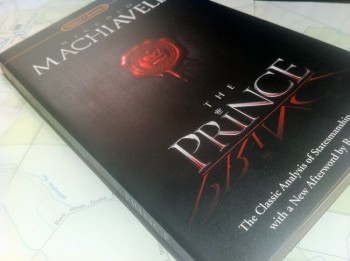As I am roughly 3/4th of the way through my military history degree while working a fulltime job, I find it difficult at times to transition from deep, historical thought into the real world. Consider my Monday night.
First, I came home from work, ate dinner, and watched a 22-minute sitcom with my wife. Next, I read a chapter from a Robertson’s Stonewall book that Richard Williams insisted I read (and for good reason!). Then I spent some time reading a fellow student’s disposition proposal in a tactical decision game as part of a course on maneuver warfare. Next, I reviewed some West Point maps on World War II in an attempt to track down German and Soviet troop positions in January 1943.
 With some spare time, I put together a quick post featuring a slick panoramic of Little Round Top that my wife stitched together. I tried watching Monday Night Football, but it was quickly apparent that the Packers were going to blowout the Vikings. I had seen enough lopsided games this past weekend, so I headed off to bed. I curled up with Machiavelli’s The Prince. After about three chapters, I came across something that relates to a thesis paper I did earlier this year on razing cities. This kept me up for a while, as I pondered the passages.
With some spare time, I put together a quick post featuring a slick panoramic of Little Round Top that my wife stitched together. I tried watching Monday Night Football, but it was quickly apparent that the Packers were going to blowout the Vikings. I had seen enough lopsided games this past weekend, so I headed off to bed. I curled up with Machiavelli’s The Prince. After about three chapters, I came across something that relates to a thesis paper I did earlier this year on razing cities. This kept me up for a while, as I pondered the passages.
Exhausted, I crashed.
So what did you do Monday night?
The next day, I arrived at work and someone asked me how my Monday was. Realizing he might not be too interested in the thoughts of a fifteenth-century mind when it comes to destroying cities, I stuck with, “It was fine.”
Things are not always this difficult though. Opportunities arise to discuss historical anecdotes and everyone loves a good quote. However, much of what I learn, I end up sharing with my wife (bless her soul!) or I store away in notes. I cringe when I watch someone passionately discuss their interests to a group of uninterested people whose eyes begin to glaze over. This is most common with guys who like to talk about their latest adventure in some online video game–“And then the warlock released a firebomb!” Those listening simply nod and say, “Uh, huh. Okay.”
History should not be like that. Ever.
Our past is what defines us and we should strive to know it and understand it. It is my firm belief that those not interested in history suffered from a boring class or never learned about an aspect that related to them. Yet, outside the academic world, historical experts are sparse. With few historians in offices, construction sites, and other workplaces, people with any interest in history have turn to TV, movies, and books. The latter is less common, but it is still an avenue. I want to give them an alternative–a human being and discussion. Yet, how do I share without annoying?
Sharing history with coworkers
My options are simple. I could act as an oracle, waiting for someone to come talk to me. With photos, maps, paintings, and figurines spread across my cube, people randomly come and ask me questions. Although it is fewer than I would like, it does happen. Last week, a Ukrainian saw my photo of the Yalta Conference and wanted to know why I had it. He recognized all the people in the photo and we discussed whether Stalin or Hitler was the bigger monster of the twentieth-century. Stalin won. A few weeks ago, another coworker came in and stared at my Civil War map for a few minutes before we started talking about the battles of Northern Virginia. He recognized the names of battlefields when he drove through the region, but he never stopped at any of them.
I could become an evangelist. Anyone who walks into my cube gets one history lesson, whether you came for one or not! I use to pin up photos of famous people and require all that entered to name the person in the photo. The goal was to get people thinking about history, but too often, those clueless about history felt dumb, which was the last thing I wanted. Ukrainians were always the best at this game.
Today I strive for a happy medium. When an opportunity arrives, I strike, but not too hard. My PowerPoint presentations often contain at least one historical lesson. This past spring, I gave a presentation on business analysis and started with Napoleon’s invasion of Russia. It related, I swear. My documents often contain quotes, which act as reminders of those who came before us. These are teasers for the moment that someone finally decides to ask me who the hell B. H. Liddell-Hart was.
Of course, when I do find someone interested in history, I whisk them away to Gettysburg or some other nearby battlefield. There, we discuss the history of America, the evolution of warfare, and similar topics.
I have a wealth of stories to tell dating back to the Assyrians all the way through the Allied conquest of Europe. Yet, I hold these stories and cherish them. I could come into work and start conversations with, “Guys, I learned the damndest thing about the Thirty Years War last night . . .” But, I do not want to overwhelm people or turn them off from history, so I wait with teasers.
Those who could be knowledgeable enough about these topics to debate or even care about them are typically in universities. I have considered joining them several times, but I think the real world needs historians among their ranks. So here I reside–Scott Manning, business analyst for a technology company and amateur historian.
Here are some of the features of my cube. My brother got me the Robert E. Lee and I later bought his Grant counterpart. The silver figure is Robert the Bruce.

